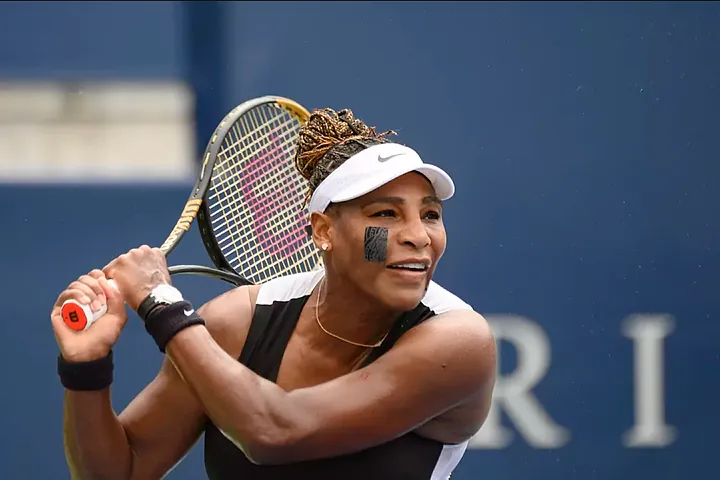
In a world where public figures are often scrutinized for every word and gesture, Alexis Ohanian’s recent emotional declaration of love for his wife, tennis legend Serena Williams, has sparked a heated debate. The tech entrepreneur, who co-founded Reddit and is known for his often outspoken social media presence, took to his platforms to share a heartfelt message celebrating his wife’s accomplishments both on and off the tennis court. While many fans hailed it as a beautiful display of admiration and affection, others questioned whether this public outpouring of love was genuine or just another example of performative PDA (Public Display of Affection).
The Declaration: True Emotion or a Strategic Move?
Ohanian’s post, which featured an emotional tribute to Serena Williams, included a reflection on their journey together, her immense impact on his life, and her unparalleled success in the world of sports. “I’m so proud of everything you’ve achieved, Serena. You’ve changed the game in ways no one could have ever imagined,” Ohanian wrote, his words accompanied by a series of images and videos that showcased key moments of Williams’ career and their personal life together.
While many fans responded with admiration and support, some couldn’t help but question whether this public declaration was truly motivated by love or if it was an attempt to boost their own public image. The rise of “performative activism” and the growing trend of influencers using their platforms for personal gain has made it increasingly difficult to discern when acts of kindness or affection are authentic and when they are merely self-serving publicity stunts. Was Ohanian’s declaration a genuine expression of his feelings, or was it simply another carefully curated moment aimed at enhancing his public persona?
The Performative PDA Debate
In today’s digital age, public figures frequently engage in acts that blur the lines between personal and professional. The “performative PDA” trend has gained traction as celebrities, influencers, and entrepreneurs alike share intimate moments with their audiences in ways that can sometimes feel more like a marketing strategy than an expression of true affection. With the advent of Instagram, Twitter, and TikTok, it has become commonplace for public figures to share their personal lives with their followers in order to foster a sense of relatability and authenticity.
This phenomenon is not exclusive to romantic relationships. Celebrities, in particular, often use social media to show their “real” selves, but this curated reality sometimes raises questions about the motivations behind the posts. Are they posting for their followers, or are they posting for themselves? Does a public declaration of love lose some of its authenticity when it is crafted for an audience?
In the case of Alexis Ohanian, his open admiration for his wife has often been a subject of praise. Ohanian has frequently taken to social media to publicly support Williams, particularly when she faced backlash or criticism in her career. His declarations of love and support could be seen as a counter-narrative to the toxic narratives often thrust upon powerful women, especially in the sports world. Still, the sheer frequency of these public displays raises the question: How much of it is truly about Serena Williams, and how much of it is about Alexis Ohanian’s public image?
The Feminist Angle: Support or Self-Promotion?
Alexis Ohanian’s vocal support for Serena Williams is also viewed through the lens of gender dynamics. As a feminist and outspoken advocate for women’s rights, Ohanian’s messages to his wife often align with a broader conversation about the unequal treatment of women in sports and beyond. In a world where women—especially women of color like Serena—are often undermined, Ohanian’s words serve as a kind of public counterpoint to that inequality. However, some critics argue that Ohanian’s brand of feminism, which seems to heavily rely on his association with Williams, risks appearing self-congratulatory rather than truly altruistic.
While Ohanian may genuinely admire and love his wife, his public declarations also serve as a reminder of his own progressive values, which have been central to his public identity. His position as a white, male ally in a movement led predominantly by women of color inevitably raises questions about the motives behind his visible support for Serena Williams. Is it truly about championing his wife, or is it about positioning himself as a champion of women’s rights in the public eye? In the highly competitive world of tech and venture capitalism, where image and reputation can make or break careers, the line between advocacy and self-promotion can become dangerously thin.
The Role of Social Media in Shaping Public Relationships
Social media plays an undeniable role in shaping how we perceive relationships, especially those involving public figures. With millions of followers and constant media attention, celebrities and influencers are often expected to share their personal lives online. In many cases, this can lead to the creation of what seems like an idealized version of love and partnership, where every milestone is documented for the world to see. While this can be seen as a positive way to spread love and positivity, it also opens the door for cynicism.
For instance, Ohanian’s tributes to Williams often come at key moments in her career, such as after her wins or personal achievements. This timing could suggest a calculated approach to keeping the public narrative focused on their relationship, rather than an impromptu expression of affection. This leaves critics questioning whether these declarations are truly heartfelt or just another way to control their public image.
Conclusion: Genuine Love or Strategic Publicity?
At the end of the day, the debate over whether Alexis Ohanian’s public declarations of love for Serena Williams are genuine or performative may not have a clear-cut answer. In a world where personal lives are increasingly intertwined with public personas, the line between authenticity and marketing is often blurred. What is undeniable, however, is the fact that Ohanian’s messages have brought attention to important issues, such as gender equality, and celebrated Serena Williams’ trailblazing career.
Whether Ohanian’s declarations are motivated by love, strategy, or a combination of both, they highlight a larger conversation about how public figures navigate their relationships in the spotlight. For some, Ohanian’s public shows of affection are a refreshing counter-narrative to the oftentimes cynical nature of celebrity culture. For others, they are a reminder that, in the age of social media, everything—even love—can be part of a carefully curated performance.





